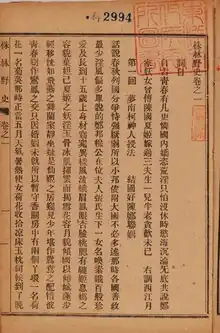Zhulin yeshi
Zhulin yeshi (Chinese: 株林野史)[lower-alpha 1] is a Chinese erotic novel by a writer under the pseudonym Chi Daoren, published between 1610 and 1620. Set in the 7th century BC, it follows a young woman and her sexual escapades.
| Zhulin yeshi | |||||||
|---|---|---|---|---|---|---|---|
| Chinese | 株林野史 | ||||||
| Literal meaning | Zhulin coarse stories | ||||||
| |||||||

Plot
Set in around 600 BC during the Spring and Autumn period, a young and unmarried lady named Su'e (素娥) dreams of being taught the art of love-making by Taoist master Hua Yue (華月).[5] First using her newfound sexual prowess to attain eternal youth,[5] she then seduces multiple men until she is stopped by a rival Taoist master who becomes her lover and joins her in her quest for immortality.[4]
Publication history
Comprising sixteen chapters[3] and twenty-one poems,[6] Zhulin yeshi was written in the late Ming dynasty by an anonymous writer using the pseudonym Chi Daoren (痴道人),[7] translated into English as "Infatuated Moralist"[7] or "Man of the Crazy Way".[4] The novel was published in Suzhou and likely had its first printing sometime between 1610 and 1620, although it was subsequently banned by the Qing government.[7]
Inspiration
The title of the novel is derived from the song "Zhulin" (株林, "tree forest") collected in the Book of Songs;[8] according to the critic Kong Yingda (孔穎達) in Mao Shi zhengyi (毛詩正義),[9] the song was written to rebuke Lord Ling of Chen (陳靈公) for his illicit sexual relationship with the femme fatale and noblewoman Xia Ji (夏姬),[10] whose "destructive beauty ... nearly caused the collapse of the state of Chen"[9] and "who was traditionally numbered among the most wicked women of Chinese antiquity."[3] In Zhulin yeshi, the main protagonist is based on Xia Ji,[7] although she is referred to as Su'e, which is in turn an apparent reference to the "extremely rare" illustrated erotic novel titled Su'e pian (素娥篇; published c. 1610).[5]
Numerous stories concerning "a woman achieving first eternal youth and then transcendency through esoteric sexual practices with multiple partners" predate Zhulin yeshi.[5] For instance, in the Liexian Zhuan (列仙傳), a female protagonist named Nü Wan (女丸) is guided by a mystery sex master.[5] Likewise, in the Han dynasty text Yufang mijue (玉房秘訣) or Secret Instructions from the Jade Chamber, the Taoist mistress Xiwangmu (西王母) is described as engaging in "sexual vampirism".[6]
Across the novel, the author adapts sexually explicit scenes from several other sources. For example, a scene in which the protagonist is in Chu, left in a pitiful state with her step-son, is "a cut-and-paste piece taken straight" from Wushan yanshi (巫山豔史) or Romantic History of Mt. Wu.[11] Zhulin yeshi also presents an "extremely confused" discussion of sex toys; a dildo, for instance, morphs into a Burmese bell without any explanation, which Olivia Milburn suggests may be due to a "garbled interpolation from some unknown source."[12]
Literary significance and reception
Zhulin yeshi is noted for its "rich descriptions of sexual life",[13] both heterosexual and homosexual.[14] Olivia Milburn writes that the female protagonists of the novel "are in striking contrast to those described in other contemporary Ming-dynasty erotic novels".[15] She also praises the author of Zhulin yeshi for their "careful erudition" and meticulous "historical background and characterizations".[16]
Notes
References
Citations
- Vitiello 2011, p. 18.
- Schonebaum 2016, p. 218.
- Milburn 2017, p. 1.
- Mair 2010, p. 665.
- Milburn 2017, p. 10.
- Milburn 2017, p. 11.
- Milburn 2017, p. 9.
- Milburn 2017, p. 7.
- Milburn 2017, p. 8.
- Milburn 2017, pp. 1–3.
- Milburn 2017, p. 13.
- Milburn 2017, p. 14.
- Hu 2013, p. 312.
- Vitiello 2011, p. 23.
- Milburn 2017, p. 18.
- Milburn 2017, p. 12.
Bibliography
- Hu, Fuchen (2013). General Theory of Taoism. Paths International Limited. ISBN 9781844640959.
- Mair, Victor H. (2010). The Columbia History of Chinese Literature. Columbia University Press. ISBN 9780231528511.
- Milburn, Olivia (2017). "The Legend of Lady Xia Ji: Two Late Ming Dynasty Portrayals of an Ancient Chinese "Femme Fatale"". Chinese Literature: Essays, Articles, Reviews. 39: 1–25. JSTOR 45014208.
- Schonebaum, Andrew (2016). Novel Medicine: Healing, Literature, and Popular Knowledge in Early Modern China. University of Washington Press. ISBN 9780295806327.
- Vitiello, Giovanni (2011). The Libertine's Friend: Homosexuality and Masculinity in Late Imperial China. University of Chicago Press. ISBN 9780226857923.